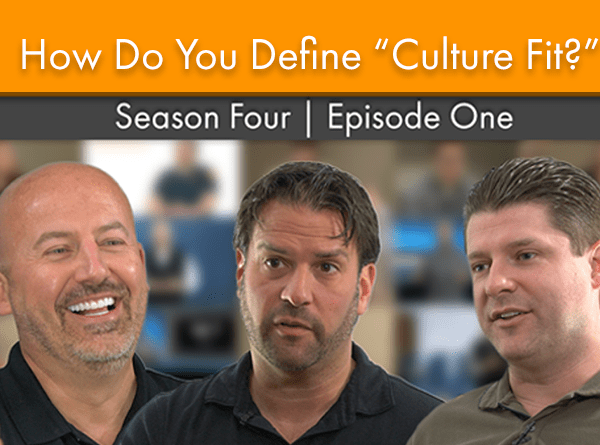
Season 4, Episode 1:
How do you define “Culture Fit”?
In this week’s episode, Qualigence International CEO Steve Lowisz interviewed Executive Recruiting Consultant, Andrew Porte and Sales Consultant, Gary Siegel, to explain the importance of building a candidate and culture fit connection.
Why is culture fit so important when talking about candidates?
“They have to be at a certain place for work all day and they want to make sure that it’s a great place for them and that they align with the company’s values,” Andrew said.
This answer is what probably first comes to mind for most of us.
How do you know what the company’s values are? When you’re recruiting or dealing with a client, how do you know if the candidate will fit in with the company?
It’s all in the details. “When you’re dealing with passive candidates that are currently employed, they’re going to want to know as much as possible,” said Gary. “What’s the culture of the company? What’s the attitude of the employees? What’s the environment like? You want to get as much information up front from client as you can about those things.”
Define culture
During the video, Andrew jokingly replied, “I’ve only met clients that have a great culture. Let’s be honest, how many clients are going to tell you they have a terrible culture?”
“You have to ask more appointed questions as far as the environment. Is this a role where it’s a lot of numbers? Is it a group collaboration and projects with everybody, or doing everything on their own? Are people working with other areas of the company quite a bit or are you kind of in your own little silo?”
There are a lot of ways you can get the client to give you the information you’re looking for without just asking the obvious question, “what is your culture like?”
On the opposite end, there are key questions you should be asking the candidate as well. “What is a good environment for you? Maybe it’s working from home, maybe it’s exposure to different areas, maybe it’s something different,” Andrew said.
Culture vs. Competency
Steve directs a few questions to our Gary, “Is culture similar to competency and where do you rank it? Is there a difference between culture and competencies of the candidate, in your opinion?”
Gary believes that they’re both equally important.
“When you’re working with passive candidates, ones that are not necessarily looking for a new job, but they’re open to the idea of a new company, as much as the skills might match, it could be a big move for them.”
Steve added, “the job itself is often the job they’re doing right now, so they want something more.” The way Steve views it, “a skillset is I know how to develop Java, competencies would be somebody who is a self-starter.”
Steve goes on to break it down even more.
“There’s skills, competencies and culture. Competencies are for the job, but there are also competencies that fit the culture, so we get all confused by what culture really means.”
What is the culture like?
Andrew mentions some key phrases he hears, “Oh we have a great culture. It’s team oriented. We don’t have managers that micromanage. We want to help everybody grow.”
We can all agree that it’s usually a red flag if the client needs to go out of their way to mention that they don’t have managers that micromanage.
It’s usually up to the recruiter or sales person to drill down on those responses from the client and dig deeper.
Gary, Steve and Andrew can all agree that, the deeper you can dig around to find out what’s really going on, the easier it is to relay that to a candidate. Sometimes it can even help combat those issues with a candidate beforehand.
Andrew agrees and points out that the culture of the group probably matters more than the culture of the entire organization. You might not be at the headquarters, or you might be working remotely. Your situation could be different from everybody else, especially with a larger company.
Steve reiterates how important it is to define the questions to specifically ask and get deeper. It needs to be broken down by competencies that fit the company and the department, competencies that fit the position, and then the simplest task will be defining the skill.
One thing to keep in mind is, “Getting the candidate in the door is one thing, getting them to stick around is something completely different,” said Steve.
About Recruiter Fuel
Recruiter Fuel is a weekly video series dedicated to all-things recruiting and talent acquisition. Learn More our mission and how you can submit a topic, be featured in an episode, or nominate an expert to guest star on an upcoming episode.
Visit the Recruiter Fuel series directory for more content.





